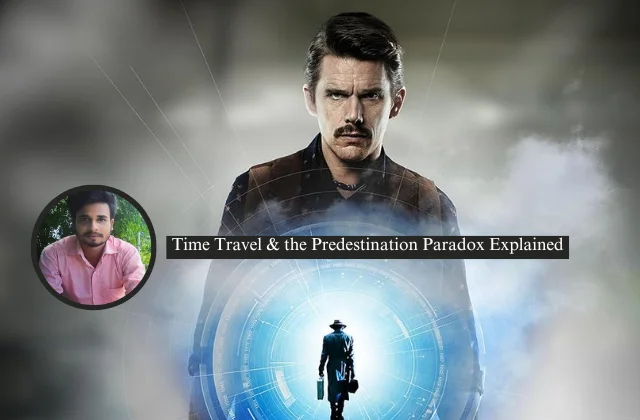Exploring the Mind-Bending Predestination Paradox
Understanding the Intricacies of Time Travel and Fixed Events
Imagine if you could travel back in time and correct a mistake you made. Not only that, but you could also fix any error caused by your actions in the past! This article will introduce you to a paradox that might just blow your mind. This paradox is known as the “Causal Loop Paradox,” also referred to as the “Predestination Paradox.”
We know that time waits for no one and moves forward in a straight line. This linear progression gives us the concepts of past, present, and future. However, the story of the Predestination Paradox is different.
The Predestination Paradox Explained
In the Predestination Paradox, time exists in a “closed loop,” where events are fixed and cannot be altered. This means that any event occurring within this loop cannot be classified as past, present, or future. Instead, it exists in a perpetual state of occurrence.
The Movie “Predestination”
To better understand this paradox, let’s look at the 2014 Hollywood film “Predestination,” which beautifully illustrates the Causal Loop Paradox. The movie’s plot can help us grasp the complexities of this paradox.
Opening Scene
The film opens with a man attempting to defuse a bomb. Suddenly, the person who set the bomb attacks him, leading to a fight. The bomb explodes, severely injuring the man’s face. As he tries to reach his time machine, a third person appears and helps him.
The Time Traveler
The man, who is actually a time traveler from the future, uses his time machine to travel to March 1975 in New York, where a bomb blast killed nearly 10,000 people. The bomber, known as “Fizzle,” is a terrorist who continues to set off bombs. A secret agency works to prevent these bombings, and the time traveler is a member of this agency.
After the bomb blast, the time traveler’s face is severely disfigured. He undergoes plastic surgery to repair his face and alter his voice. Despite the surgery, he has one final mission before retirement. He travels back to 1970 and takes a job as a bartender, waiting for a crucial encounter.
The Barkeeper
The bartender is waiting for someone, keeping an eye on the clock. Eventually, a man named John enters the bar and shares his life story with the bartender. John reveals that he was an orphaned girl named Jane, who was abandoned at an orphanage. Despite her tough demeanor and intelligence, no one adopts her.
Jane’s Journey
As Jane grows older, she meets Mr. Robertson, who introduces her to SpaceCorp, an organization that recruits strong-willed girls. Jane excels in all physical and mental tests but is eventually expelled from SpaceCorp due to a mysterious medical condition. She later becomes pregnant and gives birth to a girl. During this time, she discovers that she possesses both male and female reproductive organs. She undergoes sex reassignment surgery, becoming John, and her baby is stolen.
The Loop
John, now a man, falls in love with Jane, his past self. The bartender, who is also a time traveler, helps John travel back in time to seek revenge on the man who abandoned Jane. However, the bartender realizes that he is John’s future self, creating a loop where Jane, John, the baby, and the bartender are all the same person at different points in time.
Theoretical Implications
The Predestination Paradox raises profound questions about the nature of time and free will. If events are predestined and fixed, does that mean we have no control over our actions? This paradox suggests that our actions are merely part of a larger, predetermined sequence of events.
Philosophical Considerations
Philosophers have long debated the concept of free will versus determinism. The Predestination Paradox leans heavily towards determinism, implying that our choices are not truly our own but are dictated by the inevitable flow of time. This raises ethical and existential questions about responsibility and the meaning of life.
Scientific Perspectives
From a scientific standpoint, the Predestination Paradox is purely speculative. While theories like Einstein’s theory of relativity and the concept of spacetime curvature provide a framework for understanding time, they do not support the idea of a closed time loop. However, the paradox remains a fascinating thought experiment that challenges our understanding of time.
FAQs
What is the Predestination Paradox?
The Predestination Paradox is a theoretical scenario where events in time are fixed and cannot be altered, creating a closed loop.
Can the Predestination Paradox be proven?
As of now, there is no scientific evidence to prove the Predestination Paradox. It remains a concept within the realm of theoretical physics and science fiction.
Is time travel possible?
Currently, time travel is purely speculative. While theories like the Predestination Paradox explore its possibilities, there is no concrete evidence or technology to support time travel.
How does the movie “Predestination” illustrate this paradox?
The movie “Predestination” uses a complex narrative to show how events in a closed time loop are interconnected and fixed, making it impossible to change the past.
What are the philosophical implications of the Predestination Paradox?
The paradox raises questions about free will and determinism, suggesting that our actions may be predetermined and beyond our control.
How does the Predestination Paradox challenge scientific theories?
While scientific theories like relativity provide a framework for understanding time, they do not support the idea of a closed time loop, making the paradox a thought-provoking but unproven concept.
Conclusion
The Predestination Paradox challenges our understanding of time and causality. While it remains a theoretical concept, it offers a fascinating perspective on the nature of time and the potential consequences of time travel. Whether you’re a fan of science fiction or simply curious about the mysteries of time, this paradox is sure to captivate your imagination.
If you have any questions or need further clarification, feel free to leave a comment below. Thank you for reading!
Further Reading
For those interested in delving deeper into the concepts of time travel and paradoxes, here are some recommended resources:
- “Time Travel: A History” by James Gleick – This book explores the history and science of time travel, providing a comprehensive overview of the subject.
- “The Time Machine” by H.G. Wells – A classic novel that introduces the concept of time travel and its potential consequences.
- “A Brief History of Time” by Stephen Hawking – While not focused solely on time travel, this book provides valuable insights into the nature of time and spacetime.
By exploring these resources, you can gain a deeper understanding of the complexities and possibilities of time travel.





